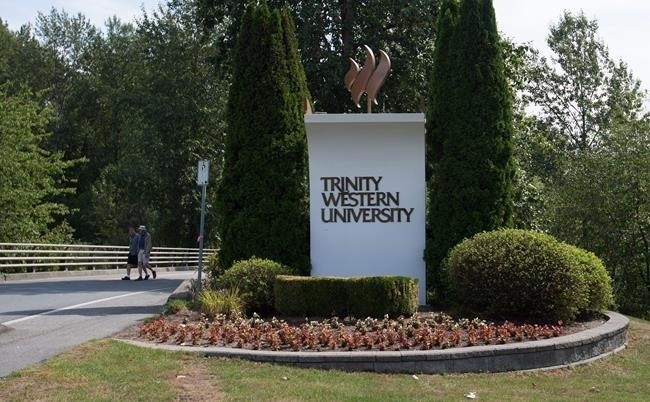
FILE PHOTO - Two men walk past the entrance to Trinity Western University, in Langley, B.C., on August 24, 2015.
Image Credit: THE CANADIAN PRESS/Darryl Dyck
August 14, 2018 - 4:30 PM
LANGLEY, B.C. - A Christian university in British Columbia will no longer require students to adhere to a covenant forbidding sex outside of heterosexual marriage.
The board of governors at Trinity Western University in Langley voted Thursday to make the school's "community covenant" voluntary for students beginning this school year.
The private institution had applied to provincial law societies for accreditation of a law school but was denied in British Columbia and Ontario because of the covenant.
In June, the Supreme Court of Canada ruled that requiring a person to behave contrary to their sexual identity is "degrading and disrespectful" in two landmark decisions that said law societies have the right to deny accreditation to the proposed law school. The high court said law societies in Ontario and British Columbia were entitled to ensure equal access to the bar, support diversity and prevent harm to lesbian, gay, bisexual, transgender and queer students.
The legal action pitted two significant societal values — freedom of religion and promotion of equality — against one another.
The motion passed Thursday said the intention behind it was to maintain Trinity Western as a "thriving community of Christian believers that is inclusive of all students wishing to learn from a Christian viewpoint and underlying philosophy."
Trinity Western will also work to determine ways in which its Christian identity can continue to be strengthened while welcoming the unique value of each member of its diverse student body, the university said in a statement issued Tuesday.
"Let there be no confusion regarding the board of governors' resolution; our mission remains the same. We will remain a biblically based, mission-focused, academically excellent university, fully committed to our foundational evangelical Christian principles," president Robert Kuhn said in the statement.
"We will continue to be a Christ-centred community; one that is defined by our shared pursuit of seeking to glorify God by revealing His truth, compassion, reconciliation and hope to a world in need."
Helen Kennedy, executive director of LGBTQ advocacy organization Egale Canada Human Rights Trust, said the covenant's continued existence is problematic, even if it's no longer mandatory.
"There is a larger issue with the covenant around creating a culture of intolerance and discrimination for incoming and current students," Kennedy said in a statement.
Both the B.C. and Ontario law societies declined to comment on the decision, saying it would be premature given that they have not been asked to review any new accreditation application by Trinity Western.
Trinity Western proposed the law school in 2012 and received approval to open from the Federation of Law Societies of Canada and British Columbia's Ministry of Advanced Education. However, the ministry later withdrew approval.
The university wanted to ensure its graduates would be eligible to be called to the bar throughout Canada, and therefore applied to the provincial law societies for accreditation of the planned school.
Six law societies — Alberta, Saskatchewan, Manitoba, New Brunswick, Prince Edward Island, and Newfoundland and Labrador — granted accreditation. Nova Scotia's law society refused accreditation, but the decision was overturned in the courts.
In Ontario, the benchers of the Law Society of Upper Canada — since renamed the Law Society of Ontario — denied accreditation to the school in a 28-21 vote.
In reviewing the decision, an Ontario court found the society had undertaken a reasonable balancing of the protections at issue. The ruling was upheld on appeal.
British Columbia's law society denied recognition to the school on the basis of a binding referendum of its members. The reviewing court ruled that the process ignored an obligation to consider the competing rights at play, and set aside the law society's decision. An appeal court upheld the ruling.
The debate around balancing religious freedom and equality rights posed a challenging subject for some civil libertarians. The B.C. Civil Liberties Association initially supported the Trinity Western's application, then reversed its position.
In a Feb. 23 letter to its members, it said the issue had been controversial both within the association and in the community at large, and that the association had struggled in determining where to draw the line when fundamental rights and liberties appear to conflict.
Ultimately, it clarified its position: "The BCCLA takes the position that the law society should not accredit a prerequisite legal education program whose admission and conduct policies discriminate against people based on prohibited grounds, thereby creating a discriminatory barrier around part of the stream of access to the legal profession."
— By Amy Smart in Vancouver
News from © The Canadian Press, 2018